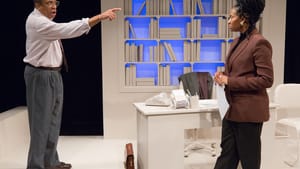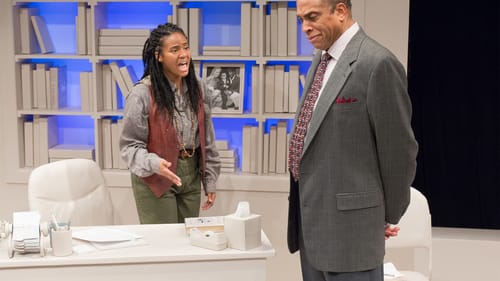Stay in the Loop
BSR publishes on a weekly schedule, with an email newsletter every Wednesday and Thursday morning. There’s no paywall, and subscribing is always free.
Trenchant tenure
Walnut Street Theatre presents David Mamet’s ‘Oleanna’

David Mamet’s two-person Oleanna, as Rita Sirianni reminds us in the playbill of the production currently onstage at the Walnut’s Studio 3, debuted not long after the Clarence Thomas Supreme Court confirmation proceedings — proceedings that, like the recent Brett Kavanaugh proceedings, improbably proceeded despite credible allegations of sexual impropriety.
It seems like the perfect time to produce a work that examines the power dynamic that plays out between a tenure-track college professor and the student who comes to him for extra tutoring. The connection to the high-profile proceedings that occupied the national spotlight only a few months ago is clear.
A familiar pattern
As Oleanna begins, we meet John (Johnnie Hobbs, Jr.), a college professor distracted by his plans to buy a new home that better befits his soon-to-be-finalized tenure status, and Carol (Jessica Johnson), the student worried she’ll fail his class. At first, John seems like a clichéd, egotistical professor — I know, you don’t; I have, you want — assigning his own book to his students and then mocking them for struggling with the contents.
John’s initial meanness is familiar to anyone who has ever encountered an emotional abuser —break a person down until she feels so insignificant in your presence that she comes to rely on you — and when Carol seems sufficiently worn down by this tactic, he switches to platitudes and apologies, subtle-but-not-really-subtle physical cues, and a warning that what happens between them should be kept private.
It’s a credit to director Debi Marcucci, as well as to Hobbs and Johnson, when I say that watching the first scene of Oleanna felt rather like watching a train-wreck in slow motion. Anyone could see the coming disaster, and nothing was going to be able to stop it.
The downside of “both sides”
The tagline for the 1994 film adaptation of Oleanna, Sirianni (the Walnut’s casting director) points out, was “Whatever side you take…you’re wrong.” Today, after watching pundits and politicians go to extreme lengths to discredit Dr. Christine Blasey Ford and the other Kavanaugh accusers, this both-sidesism seems inappropriate.
A production of Oleanna in the #MeToo era could have quickly gone sideways, but Marcucci’s interpretation of the play seems more consistent with the contemporary narrative that accusers have much more to lose than they have to gain in these situations. This directorial decision seemed on a few occasions to be at odds with the script, which attempts to inject more ambiguity into the situation than it deserves. In this production, it’s clear from the start that the power dynamic alone makes it hard to exonerate John. And as the production goes on, John’s culpability is made clearer.

Strong on a small scale
Such an intimate show would risk being swallowed whole on the Walnut mainstage, so I applaud the decision to bring the audience close to the action in Studio 3’s black box. The monochromatic playing space, designed by Roman Tatarowicz, is exposed on three sides, making it impossible for John and Carol to conceal from the audience anything they might be concealing from one another. (That being said, sitting on stage left, I spent a lot of time looking either Hobbs or Johnson squarely in the back.) And Jimmy Lawlor’s lighting design, while subtle during the play’s action, becomes something of a metanarrative between the play’s three distinct scenes.
Good, if not enjoyable
The real star of the show is Johnson, whose Carol matures over the course of the play from a desperate student to a credible accuser. Hers is the more taxing of the two roles, requiring a great deal of emotional control, and I thought I saw her wipe an understandable tear away as she exited the stage following curtain call. Hobbs, who seemed to struggle with the Mamet-ian monologues he delivers into a phone throughout the show, found his bearings as he played off of Johnson, much stronger in dialogue and moral ambiguity than when shouting at an invisible realtor or placating an invisible wife.
Oleanna is one of those plays that are impossible to say you enjoyed. The themes are too heavy, too uncomfortable, and too familiar, to offer escapism. But theater doesn’t always have to be fun to be good. The Walnut’s production is challenging, compelling, and, in 2019, uncomfortably relevant.
What, When, Where
Oleanna. By David Mamet, Debi Marcucci directed. Through February 17, 2019, at the Walnut Street Theatre’s Studio 3 (825 Walnut Street, Philadelphia). 215-574-3550 or walnutstreettheatre.org.
Sign up for our newsletter
All of the week's new articles, all in one place. Sign up for the free weekly BSR newsletters, and don't miss a conversation.

 Jillian Ashley Blair Ivey
Jillian Ashley Blair Ivey